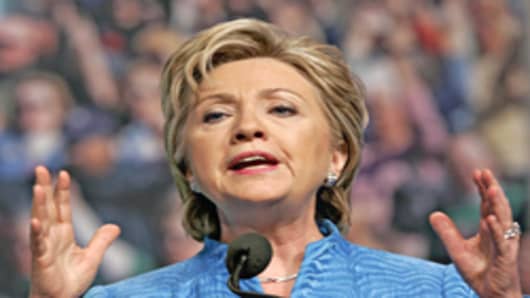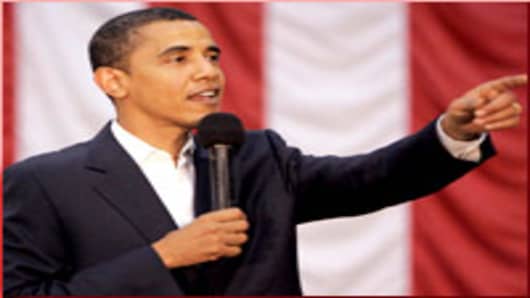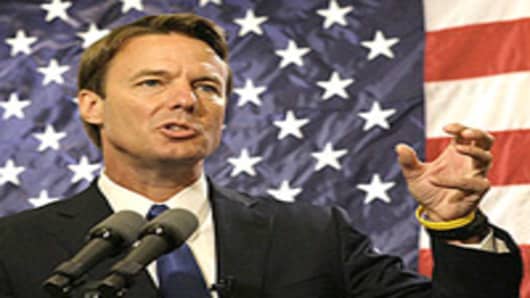Democratic presidential candidate Hillary Rodham Clinton issued a call for universal health care on Monday, plunging back into a political battle she memorably waged and lost as first lady more than a decade ago.
"This is not government-run," Clinton said of her plan to extend coverage to an estimated 47 million Americans who now go without.
She called for a requirement for businesses to obtain insurance for employees, and said the wealthy should pay higher taxes to help defray the cost for those less able to pay for it. She put the government's cost at $110 billion a year.
"Perhaps more than anybody else I know just how hard this fight will be," said the New York senator.
The two other leading Democratic candidates, Barack Obama and John Edwards, have offered healthcare proposals of their own. All three would try to build on the current health care system, keeping employer-based insurance in place, while creating subsidized programs to provide coverage for the nation's uninsured.
In that sense, Hillary Health Care 2.0 is more modest than her first effort to overhaul the entire system in 1990s.
All three candidates pledge to create a system that would provide affordable, portable coverage for all. And all three would try to reign in insurers.
How They Compare
Clinton would extend current federal programs, Medicare and the Federal Health Care Benefit plan, to all those now not covered by employer insurance or government-sponsored health plans.
Obama would create a National Plan for those who don't have access to group coverage, and would create a National Health Insurance exchange to promote greater insurance industry competition.
Edwards would establish Health Care Market, where private insurers would compete with public care for subscribers. (his plan sounds similar to the Massachusetts insurance exchange.) He would extend Medicaid and SCHIP (children's health plan) to individuals earning up to 250% of federal poverty level.
Where They Agree
Employer Mandates: All three have employer mandates for coverage. They would essentially makes businesses pay or play, by paying subsidies if they don't insure employees. (This is is similar to the Massachusetts plan and the plans being discussed in California.) But, Obama would exempt some small businesses from having to pay.
Individual mandates: Clinton and Edwards would impose individual mandates -- requiring everyone to buy insurance; Obama does not discuss individual requirement.
Reigning in insurers: All three would cut reimbursement rates to insurers for Medicare. Edwards and Obama would also cap insurers' administrative fees (not sure about Hillary on this). Edwards and Clinton would not allow insurers to deny coverage; Obama would guaranteed eligibility for National Plan.
Tax subsidies: Clinton and Edwards would provide individual tax credits to help pay for insurance. Clinton would offer tax breaks for small businesses, and but "limits the exclusion for the high-end portion of very generous plans for those making over $250,000." Obama would offer federal reinsurance for businesses dealing with catastrophic illness coverage.
How They'd Pay for It
Interestingly, none of them talk about imposing new taxes, such as a tobacco tax that has been proposed in the Senate to fund expansion of the children's health plan.
Clinton says her plan comes in at $110 Billion. She'd pay for it, in part by rolling back some Bush tax cuts, also by cutting Medicare Advantage Reimbursement.
Obama and Edwards also propose revising reimbursement rates and tax rollbacks. Edwards would repeal Bush tax for highest income earners (amounts to roughly $100 B per year).
Obama would allow tax cuts to expire in 2010.
How They'd Cut Costs
All three talk about lowering costs longer-term by pushing for more preventive care and establishing standard electronic medical record keeping. This is not new. The Bush administration has pushed for greater electronic records, and this is something congress has talked about.
It's not seen as pie in the sky: The Veterans' Administration health care system has seen great success in reducing costs through electronic records which have brought efficiency and through price negotiation for drugs and services. One of the problems, is trying to get the nation's hospitals and doctors to invest in the new technology.
Doctors have been especially slow, because it's expensive and many don't see the immediate return on investment for them.
Obama would require adoption of a standard system. (This is another issue, in terms of trying to create efficiency. Medicare has a system, but hospitals use different vendors. Not all the systems interact.)
Of course, getting consensus is another story, as we have seen in California. Arnold Schwarzenegger is still trying to push through a universal coverage plan, and being fought all along the way by his own party.
In California, they may ultimately leave the issue of funding voters in a referendum. Will people really vote to tax themselves in order to extend health coverage to others?
And the debate over the children's health plan in Washington points out just how hard it would be to gain consensus in Congress. President Bush has vowed to veto the House SCHIP plan which would extend coverage by $50 Billion over the next ten years, to more children of working class families earning up to 300% of FPL. The Senate plan would cost less, because it leaves out Medicare issues attached to the house bill, and would also fund the expansion of care with a new tobacco tax.
Reauthorization of SCHIP funding needs to be done by September 30th, when the program runs out. But after wrangling over this all summer, it looks like Congress is just going to pass a stop-gap measure and give themselves more time to work out a compromise bill.
A side-by-side comparison
CLINTON OBAMA EDWARDS
GETTING TO UNIVERSAL CARE |
|
|
|
INDIVIDUAL MANDATE |
|
|
|
EMPLOYER MANDATE |
|
|
|
INSURANCE INDUSTRY POLICY |
|
|
|
GOVERNMENT COVERAGE |
|
| |||
HEALTH CARE TAX BREAKS |
|
| |||
IMPROVING HEALTH CARE EFFICIENCY |
|
|
| ||
PHARMA |
| ||||
MAL-PRACTICE |
|
| |||
| FUNDING |
|
|
| ||
AP contributed to this report




